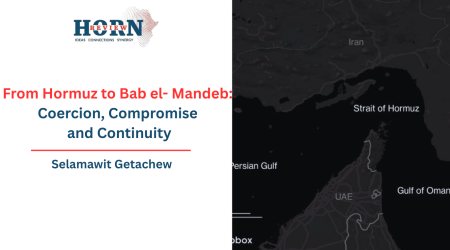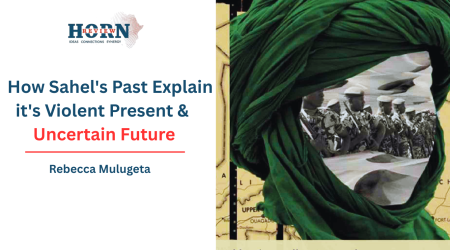
28
Jun
War without Borders: The Israel–Iran War and Strategic Shockwaves across the Horn
An evolving confrontation between Israel and Iran, rooted in decades of ideological strife and strategic rivalry, has now reached a stage where its repercussions threaten the wider Middle East and beyond. The deep-seated animosity between Israel and Iran dates back to Iran’s 1979 Islamic Revolution (Kaye et al., 2012). In the aftermath, Iran’s new leadership identified the United States, Britain, and Israel as principal adversaries, a stance shaped by their historical alliances with the deposed Shah and a legacy of Western interventionism in the Middle East. On the other hand, Israel views Iran as a comprehensive adversary posing ideological, military, and strategic threats to its national security. This perception is rooted in Iran’s support for non-state actors, its regional ambitions, and its continued pursuit of nuclear capabilities.
From that moment, Israel has viewed Iran’s nuclear ambitions as an existential threat, frequently accusing Tehran of seeking nuclear weapons capability. Over the ensuing decades, Iran cultivated a network of militant proxies the “Axis of Resistance”, including Hamas in Gaza, Hezbollah in Lebanon, and the Houthis in Yemen. This constellation of groups served both to project Iranian influence regionally and to deter any direct attack on Iranian territory. Iran’s anti-Israel policy serves to mobilize domestic support and assert leadership in the Muslim world, while Israel perceives Iran’s nuclear ambitions as an existential threat (Roomi, 2023).
For much of the past forty years, Iran maintained a forward-defense posture, relying on these proxies to keep Israel and by extension, American interests off balance. However, Israeli military operations, particularly in the aftermath of the October 7 attacks, have substantially degraded this proxy network.
The outbreak of war between Iran and Israel has exacerbated existing tensions and brought long-standing animosity between the two states into sharper, more confrontational focus (Eslami & Kaunert, 2025).What was once a shadow conflict driven by proxies and rhetoric has now escalated into a direct and volatile confrontation.
This conflict elicits a complex array of responses from international and regional actors, each driven by a unique combination of strategic interests, security concerns, and domestic imperatives. Among these actors, European states and Turkey have positioned themselves as vocal critics of the conflict while adopting divergent approaches to its management.
European nations, particularly the UK, Germany, and France, view a nuclear-armed Iran as an existential threat not only to Israel but also to the wider Middle East and global non-proliferation efforts (Müller, 2011). This profound concern is clearly reflected in their explicit support for Israel’s right to self-defense. Germany, in particular, stands as Israel’s strongest supporter in Europe, second only to the United States in terms of military aid.
These European countries are driven by a desire to safeguard energy supplies, prevent migration caused by new conflagrations, and uphold nuclear non-proliferation. They advocate for diplomacy to resolve the Iranian nuclear issue but insist that Iran must take confidence-building and verifiable measures to demonstrate its peaceful intentions. European support for Israel, while rooted in non-proliferation and security concerns, also reflects a pragmatic self-interest in preventing regional instability that could trigger new migration waves and disrupt critical energy supplies, particularly given their dependence on Middle Eastern energy. This in turn, could create an economic shock given the consequence of sudden oil price surge that would increase inflation and disrupt industries across Europe.
This reveals a blend of principled and transactional motivations underpinning their foreign policy in the region. Moreover, the decision of the Iranian parliament to block the Strait of Hormuz could trigger military confrontation involving the US, EU navies and Gulf States risking broader regional war. Europe might be drawn into the conflict through NATO obligations or alliances, especially with countries like France or the UK maintaining naval base in the region.
On the other hand, Turkey’s approach to the conflict is marked by a blend of condemnation and strategic pragmatism. Ankara has strongly denounced Israel’s strikes against Iran, labeling them a provocative breach of international law and accusing Israel of rejecting diplomatic solutions. At the same time, Turkey seeks to capitalize on the shifting balance of power, aiming to weaken Iran’s position in key regional arenas. A diminished Iran could open space for Turkish maneuvering from Iraq to Syria to Lebanon.
Despite the heightened tensions, Turkey expects stable natural gas supplies from Iran, albeit at higher costs, and has taken proactive measures to safeguard its own interests. Iran’s threats to close the Strait of Hormuz a key route for Turkish imports from Iraq, Qatar, and Saudi Arabia further exacerbates the situation. Another challenge for Turkey is the influx of refugees along its eastern border. In response, Ankara has reinforced security measures along the Iranian frontier to curb further inflows and prevent potential militant infiltration. Furthermore, concern to Ankara is the direct US military involvement, which could not only sabotage its diplomatic reset with Washington but also draw Turkey into Iran’s crosshairs as a potential target for retaliation given its NATO membership. Since Ankara agreed to host the early warning system radar in 2011, Iran has consistently criticized the decision, accusing the Turkish government of yielding to Western pressure and now it is claiming that westerns are using this radar in this war. Although data gathered from the radar is, by rule, shared strictly within NATO channels and only with member states, Turkey’s stance toward Israel and its repeated condemnations may risk undermining or complicating its role within NATO, potentially creating divergent stances in the alliance.
Turkey is taking its own measures in case the war spilled into its territory. These includes ramping up missile production, placing military units on high alert, and convening security meetings to assess potential emergency scenarios. Yet Turkey’s strategic objectives extend beyond rhetoric.
The direct impact of the Iran–Israel war on the Red Sea corridor also rings alarm bells for the Horn of Africa. Disruption at Bab el-Mandeb would imperil the vital lifeline carrying goods to and from East African ports, magnifying economic hardship and heightening security threats in a region already grappling with political fragility and piracy. European and Turkish efforts to reassure Horn partners now include talks on alternative routes, joint naval patrols and contingency planning to avert humanitarian fallout.
At the same time, Europe’s insistence on energy security, migration management and non-proliferation showcases the shared stakes in both Middle Eastern and Horn of Africa stability. The coming weeks will test whether Turkey and its European partners can reconcile strategic rivalries in order to contain a war that already threatens to redraw the geopolitics of three continents.
By Yonas Yizezew,Researcher,Horn Review
References
- D. D. Kaye, Alireza Nader, P. Roshan (2012). Israel and Iran: A Dangerous Rivalry. RAND Corporation.
- Roomi, F. (2023). The Iran‐Israel Conflict: An Ultra‐Ideological Explanation. Middle East Policy.
- Eslami, M., & Kaunert, C. (2025). Forward Defence, Hamas‐Hezbollah War With Israel and Iran’s Path to Nuclear Bombs. Global Policy.
- Müller, P. (2011). EU Foreign Policymaking and the Middle East Conflict: The Europeanization of national foreign policy.










